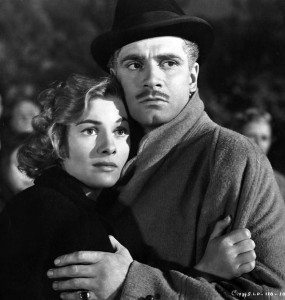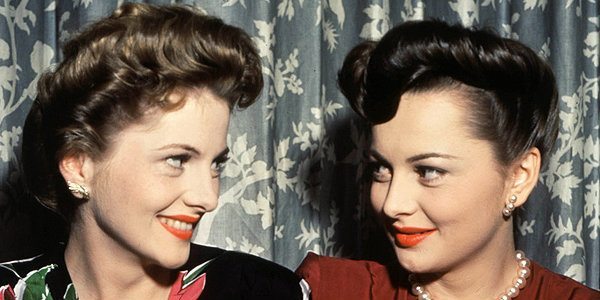A Tribute to Joan Fontaine
Her delicate doe eyes and restrained vulnerability made her the star of countless romantic melodramas, and her off-screen antagonism with her sister Olivia de Havilland made her one half of Hollywood’s most infamous sibling rivalry. Joan Fontaine died peacefully in her home on 15th December 2013 at the impressive age of 96. I was saddened to hear of Fontaine’s death, as her film Rebecca was one of the first black-and-white movies I would agree to sit through at the age of 8 or 9, and has remained a favourite ever since. There certainly doesn’t seem a better time to pay tribute to a woman whose life was intensely dramatic, both on and off the screen.
She was born Joan de Havilland, but changed her name when she became a professional actress as her mother refused to let her use the family name. After her stage debut in 1935, she was quickly given a contract by RKO Pictures and appeared in various bit parts and a few more prominent roles during the late 1930s. After she failed to make an impression on audiences or box office figures, Fontaine’s contract was not renewed and she came close to giving up acting. But her fortunes were unexpectedly transformed one night at a dinner party when she found herself seated next to great Hollywood producer David O. Selznick. Fontaine recommended a friend for the lead in Selznick’s latest project Rebecca, which would be Alfred Hitchcock’s American debut. Selznick declined her suggestion, and asked Fontaine to audition instead.
It took six months of screen tests, but eventually Fontaine secured the role of Mrs De Winter, beating hundreds of other actresses for the part. However, filming was far from a pleasant experience for Fontaine. Partly through Hitchcock’s influence, she felt isolated from the largely British cast, especially from Laurence Olivier (Max De Winter) who had openly preferred his lover, Vivian Leigh, for Fontaine’s role. But the film’s release won Fontaine widespread critical acclaim and an Academy Award nomination, as well as ushering her into Hollywood stardom.
Fontaine’s talents made her one of the first names in the Hollywood romantic melodrama. She gained an Academy Award in 1941 for her performance in Hitchcock’s Suspicion, and another nomination for The Constant Nymph in 1943. As well as starring in prestigious literary adaptations of Jane Eyre and Ivanhoe, she worked with some of the greatest directors of the period including Billy Wilder and Max Ophuls.
Joan Fontaine is equally famous for her long-standing feud with sister, Olivia de Havilland, most famous for playing Melanie in Gone With the Wind. Fontaine resented her sister from childhood, as she believed her mother favoured Olivia. Their rivalry came to a head when Fontaine won her Academy Award for Suspicion over her sister’s performance in Hold Back the Dawn (though Olivia would later win the Best Actress award for To Each His Own and The Heiress, which made the sisters the only pair of siblings to win lead Oscars for acting at the Academy Awards). Fontaine said in an interview, “I married first, won the Oscar before Olivia did, and if I die first, she’ll undoubtedly be livid because I beat her to it!” a remark which is now sadly tinged with irony. De Havilland described herself as “shocked and saddened” after her sister’s death.
Fontaine was married and divorced four times – to an actor, an actor/producer, a producer/writer, and to the golf editor of Sports Illustrated – but found the pressures of stardom made sustaining a relationship impossible. As well as her own daughter with her second husband, Fontaine adopted a four-year-old Peruvian girl called Martita. The star promised the girl’s parents that she would send Martita to visit them when she reached sixteen, but the girl refused to go, causing a severe rift between her and her adopted mother. Whilst promoting her autobiography, Fontaine said, “Until my adopted daughter goes back to see her parents, she’s not welcome. I promised her parents. I do not forgive somebody who makes me break my word.”
The enduring appeal of Joan Fontaine’s performances is that despite the all the glitz of stardom, she projects the image of perfect ordinariness. She was the 40s Hollywood ‘every girl’, and directors saw that women of the time didn’t only want to be Joan Fontaine – they felt like her. As Fontaine herself said, “Supposedly, Hitchcock saw one of my tests [for Rebecca] and said, ‘This is the only one’. I think the word he used to describe what set me apart was ‘vulnerability’.”
The Best of Fontaine: My Top Picks
1. Rebecca (1940)
The part that catapulted Fontaine into stardom. She plays the inexperienced new wife of gloomy aristocrat, Max De Winter. As she uncovers more secrets about Max’s first marriage to the beautiful Rebecca, Fontaine’s character becomes increasingly convinced that they will never be free of the past.
2. Letter From an Unknown Woman (1948)
‘By the time you read this I may be dead,’ begins a letter addressed to philandering concert pianist, Stefan, played by the effortlessly suave Louis Jourdan. He uncovers the story of Lisa (Joan Fontaine), a shy beauty who has spent her life passionately, but hopelessly, in love with him. One of the greatest stories of unrequited love in cinematic history.
3. Jane Eyre (1943)
Fontaine starred in Charlotte Brontë’s classic story of passion and confinement as the poor but determined orphan, Jane Eyre. Leaving the inhuman cruelty of Lowood School, she takes a position as governess at the mansion of Mr Rochester (Orson Welles at his most brooding). But who or what is the source of the unearthly shrieks which Jane hears coming from the attic?


Comments